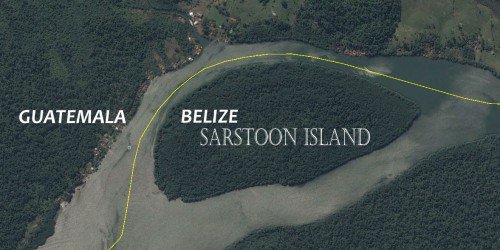- Submit News
- 501-666-6726
- [email protected]

Belize defeated by Bahamas, 86-72; eliminated from FIBA AmeriCup Pre-Qualifier Tournament
February 25, 2019
PUP says PM is in contempt of court
February 25, 2019Posted: Monday, February 25, 2019. 7:30 pm CST.
The Maritime Areas Bill was passed under the second administration of the late George Cadle Price after then-President of Guatemala, Jorge Serrano, recognized the state of Belize in 1991 and an acceleration in negotiations took place. A majority of members of the U.D.P., then in Opposition and including future Foreign Affairs Minister and Prime Minister Dean Barrow, supported and campaigned for the Bill. But others such as the late Philip Goldson and Derek Aikman broke away in opposition.
The Act proposed to set aside territorial waters from Ranguana Caye to the Sarstoon River in negotiation over limits and boundaries between the countries.
In Guatemala in 1993, a coup brought in more hard-line elements that reversed the earlier position. The U.D.P. came together with Goldson’s National Alliance for Belizean Rights and won the 1993 general election, as then-Prime Minister Manuel Esquivel pledged that the Act would be repealed, but it never was.
Now that there is no further negotiation taking place, the Act should be amended to take that sticking point off the table, as both sides agree. With the onset of the April 10, 2019 referendum, assurances have been sought that Belize would take back its concessions to Guatemala on this matter. Speaking in the House of Representatives in January, 2017, Prime Minister Barrow made clear that while Belize had never given up its maritime rights, with the situation having changed irrevocably, in due time the Act would be amended to restore those full maritime rights.
According to the Prime Minister, “I understood that we made it absolutely plain that our right under international law is our right – nobody can take that away – but that for so long as it took to try and proceed with the negotiations, we would refrain from exercising a right that we repeated we have and will always have, so I think that should be made clear.”
He added that while he is personally in favor of amending the Act, at this point it is “anticipation” of what is to come.
Later in 2017, the Opposition in the Senate, led by former foreign affairs Minister Eamon Courtenay, sought to introduce a motion to amend the Act, despite the protests of the Government that it ought to be introduced in the House of Representatives first, and that there was no hurry in any event to make amendments.
Current Minister Wilfred Elrington made the point to Channel 5 News in an interview that, “If the Maritime Areas Act has been harmful to us, the harm was done in 1993. Nothing we do now is going to make it different. The harm was done in 1993. Because what is going to happen when we do go to the I.C.J. is they will look at what you were prepared to do in 1993, even though later on we decided to resile from that position, they are going to look at all the documentation.” Elrington noted a Cabiinet discussion which reviewed documentation advising changes to the law from 2001, but could not explain why neither PUP nor UDP administrations since 1993 sought any changes. Nonetheless, he claimed, the Government’s attorneys in the U.K. have advised Belize not to move at this time.
Arguing in favor of an amendment, Courtenay personally sought additional scholarship from two critically acclaimed international legal experts – Dr. Phillipa Webb and Amal Clooney – who bolster the established view that amending the Act now, gives Belize a stronger position if it appears before the I.C.J. He said to News Five, “a legislative amendment, supported by a declaration or exchange of notes, would strengthen Belize’s position in an I.C.J. case. It would prove that there is no tacit agreement between Belize and Guatemala to a three nautical mile limit in the area from the mouth of the Sarstoon to Ranguana Caye, and it would rebut any argument regarding estoppel or a unilateral undertaking,” adding that Belize should not be taking legal advice on diplomatic matters with Guatemala such as this is, only the legal position on the claim. Elrington has never disclosed from which attorneys Belize is seeking advice.
Courtenay also noted that by internal resolution, the P.U.P. also had the option to “commence a claim in the Supreme Court seeking a declaration that Sections Three and Seven of the Maritime Areas Act are invalid and have no force of law which is something that we intend to do.” As of this writing, they have not done so.
The vote in the Senate went along party lines with Senator Ashley Rocke casting the decisive vote.
In January during the press conference of the five former foreign ministers declaring their support for taking the case to the I.C.J., Lisa Shoman maintained that “As framed, the Maritime Areas Act will not affect our case at all,” but conceded that at some point the Act needed to be amended.
And that is where it stands at the moment with six weeks to go to the April referendum. Neither party has articulated whether they will propose changes if Belize votes yes.
Advertise with the mоѕt vіѕіtеd nеwѕ ѕіtе іn Belize ~ We offer fully customizable and flexible digital marketing packages. Your content is delivered instantly to thousands of users in Belize and abroad! Contact us at mаrkеtіng@brеаkіngbеlіzеnеwѕ.соm or call us at 501-612-0315.
© 2019, BreakingBelizeNews.com. Content is copyrighted and requires written permission for reprinting in online or print media. Theft of content without permission/payment is punishable by law.



































































Comments